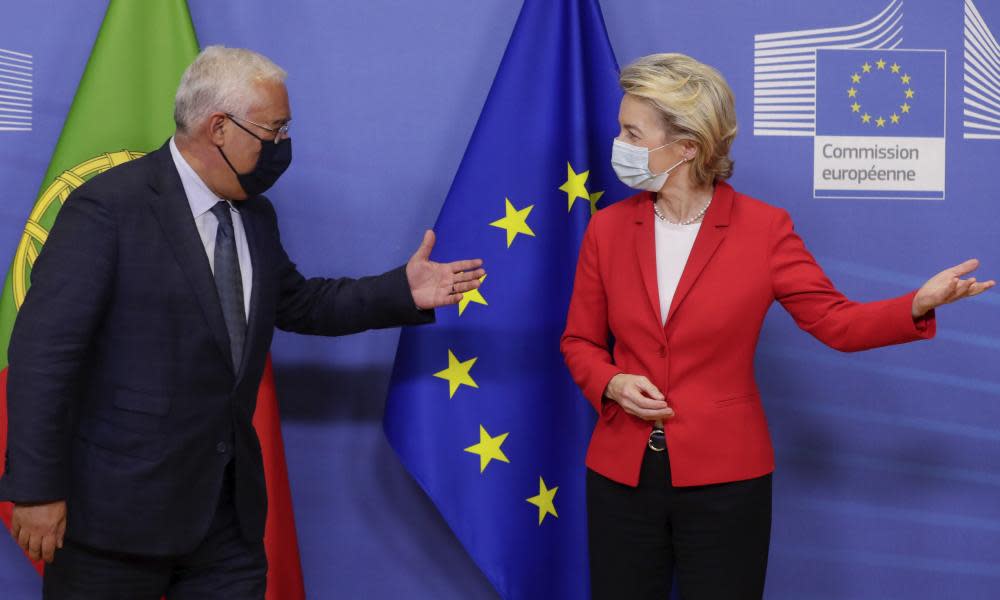Von der Leyen: Hungary and Poland should take EU budget row to court

Hungary and Poland should take the EU to court rather than make millions suffer by blocking its €1.8tn (£1.6tn) budget and recovery fund, Ursula von der Leyen has said in an 11th hour effort to resolve a row over attempts to link funds to the rule of law.
With Budapest and Warsaw refusing to sign off on the EU’s spending plans as long as respect for democratic norms remains a condition for payment, the European commission president laid down a challenge to the two governments.
In response to claims by Hungary’s premier, Viktor Orbán, and Mateusz Morawiecki, the Polish prime minister, that the proposed mechanism is not in line with the EU’s founding treaties, Von der Leyen said they should take their complaints to the European court of justice.
The terms of the rule of law condition have already been agreed by the necessary qualified majority of member states. It is only Hungary and Poland’s refusal to back the wider seven-year budget known as the multiannual financial framework (MFF) and the Next Generation EU recovery pot that is standing in the way of disbursement of the funds.
Without agreement on the whole package by 7 December – the deadline for MEPs and member states to sign off on an annual budget for 2021 – the bloc faces implementing an austerity budget for next year known as the “provisional twelfths” for the first time in three decades.
Payments for EU officials’ salaries would be paid, as would subsidies to farmers, but structural funds to the least wealthy countries would stop. The recovery fund, on which Italy and Spain are particularly reliant for the rebuilding of their economies, would not be unlocked.
Von der Leyen told regional and national parliamentarians in an online debate that citizens should not be made to suffer over the row. She said: “We think that the conditionality mechanism is appropriate. It is proportionate, and it is necessary. And it is hard to imagine that anyone could object.
“But if someone does have legal doubts, there is a very clear path, they can go to the European court of justice, this is the place where we usually thrash out differences of opinion regarding legal tests, and not at the expense of millions of Europeans who are desperately waiting for our help, because we are in the middle of a deep, deep crisis.”
After days of gruelling debate, all 27 EU leaders had agreed to including a rule of condition in the budget and recovery package in July. The details were then negotiated over three months by the European parliament and the German presidency of the EU acting on behalf of the member states.
Two weeks ago Poland and Hungary vetoed the whole package, claiming they would not accept inclusion of a sanction regime based on a “legally vague” definition of the rule of law.
Both governments have been accused of undermining the independence of their judiciaries in recent years.
The commission has been unable to effectively respond as it requires unanimity for a member state to be sanctioned under article 7 of the treaties and both governments have vowed to block any such measures.
Member states including the Netherlands, Finland, Denmark and Sweden have insisted they will not accept a watering down of the rule of law mechanism agreed with the European parliament, claiming their electorates would not tolerate Brussels turning a blind eye to corruption and authoritarian governance.
But the two rightwing governments further toughened their position on the new rule of law mechanism last week by insisting the EU would need to reopen the treaties if it wished to link the bloc’s financial interests to the rule of law.
That move only hardened the stance of some governments. According to one source, France’s most senior representative in Brussels told his peers last week: “The French republic will not bow to an illiberal democracy.”
Orbán flew to Warsaw on Monday night to hold talks with Morawiecki. After the meeting a spokesman for the Polish government said Warsaw was open to proposals. “We are convincing our partners that arbitrary criteria for judging the rule of law in certain countries can in the future lead to the collapse of the EU,” the spokesman said.
A senior diplomat from a member state opposed to changes to the mechanism said that while there was some evidence the two countries might be looking for a “ladder to climb down”, it was not up to the other 25 member states to provide solutions. “This is their problem, they should solve it,” the diplomat said.
EU leaders will meet on 10 December at a summit likely to be dominated by the issue and Brexit.

 Yahoo News
Yahoo News 
